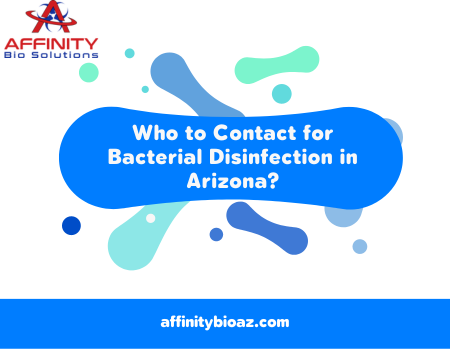Bacterial infections can pose serious threats to public health, and timely disinfection is crucial to curb their spread. In the arid climate of Arizona, where a variety of bacteria can thrive, it’s essential to know who to contact for effective bacterial disinfection. This article will guide you through the process of finding the right contacts for bacterial disinfection in Arizona, ensuring a swift and efficient response to safeguard public health.
Understanding the Importance of Bacterial Disinfection
 Arizona’s diverse landscape, ranging from urban centers to rural areas, creates environments where bacteria can flourish. Bacterial infections can be transmitted through water, air, and surfaces, making it imperative to implement rigorous disinfection measures. Whether it’s a public space, healthcare facility, or residential area, effective bacterial disinfection is key to preventing outbreaks and protecting the community.
Arizona’s diverse landscape, ranging from urban centers to rural areas, creates environments where bacteria can flourish. Bacterial infections can be transmitted through water, air, and surfaces, making it imperative to implement rigorous disinfection measures. Whether it’s a public space, healthcare facility, or residential area, effective bacterial disinfection is key to preventing outbreaks and protecting the community.
Government Health Departments
The first point of contact for bacterial disinfection in Arizona is the state’s health department. The Arizona Department of Health Services (ADHS) plays a pivotal role in safeguarding public health through various programs, including infection prevention and control. They provide guidance, resources, and support to communities facing bacterial threats.
Local Health Departments
In addition to the state health department, reaching out to local health departments is crucial. Arizona is divided into counties, each with its own health department overseeing public health matters. For example, Maricopa County Department of Public Health and Pima County Health Department are vital resources for residents and businesses seeking information and assistance regarding bacterial disinfection.
Environmental Protection Agencies
Bacterial contamination can often be linked to environmental factors, such as water sources and air quality. The Arizona Department of Environmental Quality (ADEQ) is responsible for protecting the state’s air and water quality. If bacterial contamination is suspected to be related to environmental factors, contacting ADEQ can provide insights and assistance in addressing the issue.
Public Health Agencies
Several non-profit organizations and public health agencies operate in Arizona, working to enhance community well-being. The Arizona Public Health Association (AzPHA) is an example of an organization committed to promoting public health. While they may not directly provide disinfection services, they can offer valuable information, resources, and connections to reputable service providers.
Water and Wastewater Treatment Authorities
Waterborne bacteria are a significant concern, and contacting the relevant water and wastewater treatment authorities is crucial. Arizona has multiple agencies overseeing water quality, such as the Arizona Department of Water Resources (ADWR) and the Arizona Corporation Commission. These agencies can guide you on water testing, treatment, and disinfection measures to ensure the safety of drinking water.
Professional Disinfection Services
For a more direct approach to bacterial disinfection, contacting professional disinfection services is advisable. Numerous companies in Arizona specialize in environmental and microbial remediation, offering services tailored to bacterial disinfection. These services may include surface disinfection, air purification, and water treatment, depending on the specific needs of the situation.
Local Pest Control Services
In some cases, bacterial contamination may be linked to pests and rodents. Local pest control services are equipped to address these issues by eliminating the source of the problem. They can provide thorough inspections, implement targeted treatments, and offer guidance on preventive measures to avoid future bacterial outbreaks related to pests.
Healthcare Facilities and Laboratories
For situations involving healthcare settings or the need for advanced testing, contacting healthcare facilities and laboratories is essential. Hospitals, clinics, and diagnostic laboratories have the expertise to identify and manage bacterial infections. They can offer guidance on proper disinfection protocols and may collaborate with other agencies to address public health concerns.
Community Engagement and Education Programs
Prevention is as important as intervention when it comes to bacterial infections. Engaging with community programs and educational initiatives can help raise awareness about preventive measures and promote good hygiene practices. Local health fairs, workshops, and educational campaigns can be excellent resources for disseminating information and preventing the spread of bacteria.
In the vast and varied landscape of Arizona, the risk of bacterial infections necessitates a coordinated effort from various entities. Knowing who to contact for bacterial disinfection is crucial for a swift and effective response to protect public health. Government health departments, environmental protection agencies, professional disinfection services, local pest control, healthcare facilities, and community programs all play integral roles in addressing bacterial threats. By understanding the available resources and establishing clear lines of communication, Arizona can be better equipped to tackle bacterial infections and create a healthier and safer environment for its residents.

